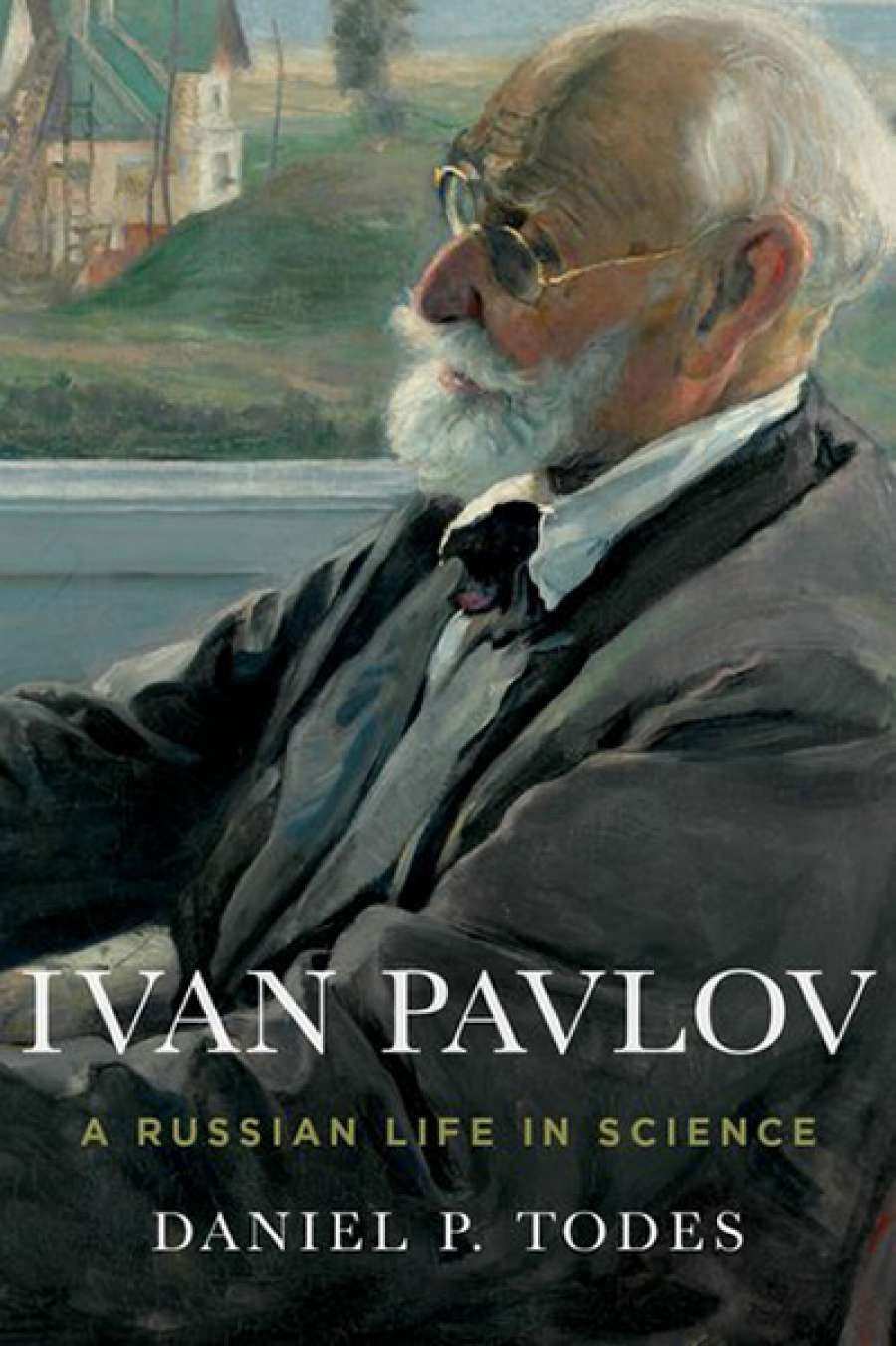
- Free Article: No
- Contents Category: Science and Technology
- Custom Article Title: Nick Haslam reviews 'Ivan Pavlov: A Russian life in science' by Daniel P. Todes
- Book 1 Title: Ivan Pavlov
- Book 1 Subtitle: A Russian life in science
- Book 1 Biblio: Oxford University Press $52.95 hb, 855 pp, 9780199925193
For the dogs involved, this special status was a cross to bear. Pavlov’s preferred experimental method was to perform surgeries that allowed the animal’s salivary, gastric, or pancreatic secretions to be collected via fistulas. The vivisected animals were then exposed to an assortment of conditions and their secretions precisely measured. The cruelty of these studies reveals the extent to which Pavlov sometimes failed to see dogs as people. In ‘sham feeding’ experiments, food was ingested but fell through an incised hole in the oesophagus back into the feeding bowl, to be devoured all over again in Sisyphean fashion. In ‘teasing experiments’, food was presented to the animal but withheld. Pavlov’s observation that salivation sometimes increases when food is merely signalled rather than consumed – what he called ‘psychic secretion’ – revealed a way for mental phenomena to be examined in liquid form. His studies of the determinants of this ‘psychic juice’ were carried out on an industrial scale, as was his collection of bottled canine gastric juice for the treatment of human dyspepsia, the sales of which supported his laboratory’s work.
Todes leaves no aspect of Pavlov’s life and times unexplored. His biography is comprehensive on the subject of Pavlov’s scientific development, starting from his turn away from religion as a young seminarian to his role as an elder statesman of the Soviet academy in the 1930s. Scientific success came slowly to Pavlov, and his story offers hope for despairing young scholars the world over. At the age of thirty-two his long-gestating dissertation was rejected by its examiners. A year later, in 1883, after becoming side-tracked by a new theory of urination, he submitted another thesis that received a grudging pass. By the age of forty Pavlov had been passed over for two junior academic positions, had experienced a period of homelessness, and was employed as a part-time lecturer in pharmacology, outside his true field of expertise. A mere fifteen years later, in 1904, he was awarded the Nobel Prize for Physiology or Medicine, the first Russian to be so honoured. A similar false dusk can be seen in the early career of Sigmund Freud, whose scientific work was derailed by the need to make a living as a neurologist in private practice, and veered off alarmingly into theories of the nasal origins of neurosis and the therapeutic value of cocaine. We can imagine the two towering figures in the late 1880s, dreaming parallel dreams, in St Petersburg and Vienna, of the future success that seemed to be slipping away from them.
 Ivan Pavlov (Deschiens, Wikimedia Commons)Todes does not present Pavlov’s life simply as the trials and triumphs of a singular scientific hero. The book embeds him in his moment in history and his life outside the laboratory: his troubled relationship with his father, his illnesses, his enduring affair with a colleague, the summers in his beloved Baltic dacha, and his many battles with the Soviet authorities. Pavlov’s attitude towards the latter was for many years antagonistic, his dissidence only tolerated because of his global scientific standing. Announcing that the Russian Revolution had created a mass neurotic breakdown and that Lenin’s dictatorship of the proletariat was only ‘the administration of slaves’ did not endear him to the revolutionaries, who confiscated his Nobel Prize funds. Nevertheless, Pavlov was equally averse to the tsars and the Orthodox Church, and as a fervent Russian patriot he eventually accommodated himself to the Soviet regime. Its ideologues in turn did their best to co-opt Pavlov’s science, representing it as a source of ‘water for the materialist mill’.
Ivan Pavlov (Deschiens, Wikimedia Commons)Todes does not present Pavlov’s life simply as the trials and triumphs of a singular scientific hero. The book embeds him in his moment in history and his life outside the laboratory: his troubled relationship with his father, his illnesses, his enduring affair with a colleague, the summers in his beloved Baltic dacha, and his many battles with the Soviet authorities. Pavlov’s attitude towards the latter was for many years antagonistic, his dissidence only tolerated because of his global scientific standing. Announcing that the Russian Revolution had created a mass neurotic breakdown and that Lenin’s dictatorship of the proletariat was only ‘the administration of slaves’ did not endear him to the revolutionaries, who confiscated his Nobel Prize funds. Nevertheless, Pavlov was equally averse to the tsars and the Orthodox Church, and as a fervent Russian patriot he eventually accommodated himself to the Soviet regime. Its ideologues in turn did their best to co-opt Pavlov’s science, representing it as a source of ‘water for the materialist mill’.
Ivan Pavlov: A Russian life in science is an exceptional scientific biography, but it is also a vivid portrait of its time and place. Todes wears his exhaustive research lightly, never burdening the reader with unnecessary or undigested detail. Unlike Pavlov’s dogs, teased and drained into a state of perpetual appetite, the reader is left fully sated.


Comments powered by CComment